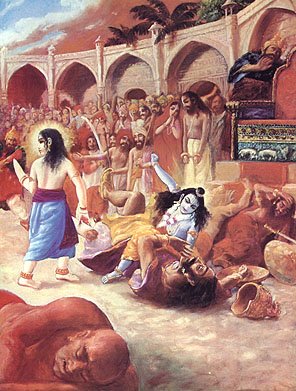|
If
those who are extremely offensive
are killed
by the grace of the Lord,
that
is good for them.
|

|
If
those who are extremely offensive
are killed
by the grace of the Lord,
that
is good for them.
|

|
TRANSLATION:
When Lord Brahma heard everything from the demigods and the members
who had attended the sacrifice, he replied: You cannot be
happy in executing a sacrifice if you blaspheme a great personality
and thereby offend his lotus feet. You cannot have happiness in that
way.
PURPORT: Lord
Brahma explained to the demigods that although Daksa wanted to enjoy
the results of fruitive sacrificial activities, it is not
possible to enjoy when one offends a great personality like Lord Siva.
It was good for Daksa to have died in the fight because if he had
lived he would have committed such offenses at the lotus feet of great
personalities again and again. According to Manu's law,
when a person commits murder, punishment is beneficial for him because
if he is not killed he might commit more and more murders and
therefore be entangled in his future lives for having killed so many
persons. Therefore the king's punishment of a murderer is appropriate.
lf those who are extremely offensive are killed by the grace
of the Lord, that is good for them. ln other words, Lord Brahma
explained to the demigods that it was good for Daksa to have been
killed.
(S.B. 4.6.4)
Note: You cannot
be happy in executing a sacrifice (Turley case) if you blaspheme a
great personality (Srila Prabhupada) and thereby offend his lotus
feet. You cannot have happiness in that way....it is not possible to
enjoy when one offends a great personality like Lord Siva (or Srila
Prabhupada). It was good for Daksa (or all the Blasphemers in Turley
case) to have died in the fight because if he had lived he
would have committed such offenses at the lotus feet of great
personalities again and again....lf those who are extremely
offensive (such as those who try to defame Srila Prabhupada) are
killed by the grace of the Lord, that is good for them. ln
other words, Lord Brahma explained to the demigods that it was good
for Daksa (or all the Blasphemers in Turley case) to have been killed.
Thus
when Sati saw that her father was performing great sacrifices but
had no respect for the greatest devotee, Lord Siva, she was very
angry. This is fitting; when Visnu or a Vaisnava is insulted, one
should be angry.
TRANSLATION:
The followers of Lord Siva, the ghosts, were ready to injure or kill
Daksa, but Sati stopped them by her order. She was very angry and
sorrowful, and in that mood she began to condemn the process of
sacrificial fruitive activities and persons who are very proud of
such unnecessary and troublesome sacrifices. She especially
condemned her father, speaking against him in the presence of all.
PURPORT: The
process of offering sacrifices is especially meant to satisfy Visnu,
who is called Yajnesa because He is the enjoyer of the fruits of all
sacrifice. Bhagavad-gita (5.29) also confirms this fact. The Lord
says, bhoktaram yajna-tapasam. He is the actual beneficiary of all
sacrifices. Not knowing this fact, less intelligent men offer
sacrifices for some material benefit. To derive personal material
benefits for sense gratification is the reason persons like Daksa
and his followers perform sacrifices. Such sacrifices are condemned
here as a labor of love without actual profit. This is confirmed in
Srimad-Bhagavatam. One may prosecute the Vedic injunctions of
offering sacrifices and other fruitive activities, but if by such
activities one does not develop attraction for Visnu, they are
useless labors. One who has developed love for Visnu must develop
love and respect for Visnu's devotees. Lord Siva is considered the
foremost personality amongst the Vaisnavas. Vaisnavanam yatha
sambhuh. Thus when Sati saw that her father was performing
great sacrifices but had no respect for the greatest devotee, Lord
Siva, she was very angry. This is fitting; when Visnu or a Vaisnava
is insulted, one should be angry. Lord Caitanya, who always
preached nonviolence, meekness and humility, also became angry when
Nityananda was offended by Jagai and Madhai, and He wanted
to kill them. When Visnu or a Vaisnava is blasphemed or dishonored,
one should be very angry. Narottama dasa Thakura said, krodha
bhakta-dvesi jane. We have anger, and that anger can be a great
quality when directed against a person who is envious of the Supreme
Personality of Godhead or His devotee. One should not be tolerant
when a person is offensive towards Visnu or a Vaisnava. The anger of
Sati towards her father was not objectionable, for although he was
her father, he was trying to insult the greatest Vaisnava. Thus
Sati's anger against her father was quite applaudable.
(S.B.
4.4.10)
DEFAMING
A PURE VAISNAVA
IS AN
EXTREMELY SEVERE OFFENSE
TRANSLATION: "O sinful person, envious of pure devotees, I shall not deliver you! Rather, I shall have you bitten by these germs for many millions of years.
PURPORT:
We
should note herein that all our sufferings in this material world,
especially from disease, are due to our past sinful activities. And
of all sinful activities, actions directed against a pure devotee
out of sheer envy are considered extremely severe. Sri
Caitanya Mahaprabhu wanted Gopala Capala to understand the cause of
his suffering. Any person who disturbs a pure devotee
engaged in broadcasting the holy name of the Lord is certainly
punished like Gopala Capala. This is the instruction of Sri
Caitanya Mahaprabhu. As we shall see, one who offends a
pure devotee can never satisfy Caitanya Mahaprabhu unless and until
he sincerely regrets his offense and thus rectifies it.
(C.C. Adi
Lila 17.51)
This
brahmana, Gopala Capala, wanted to defame Srivasa Thakura by
proving that he was actually a sakta, or a worshiper of Bhavani,
the goddess Durga, but was externally posing as a Vaisnava.
(C.C.
Adi Lila 17.37-38)
|